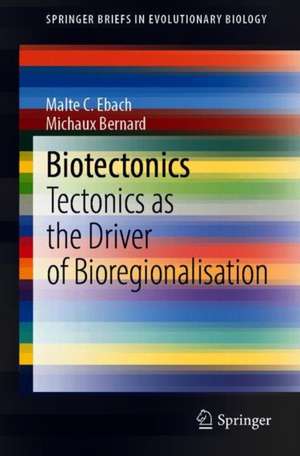Biotectonics: Tectonics as the Driver of Bioregionalisation: SpringerBriefs in Evolutionary Biology
Autor Malte C. Ebach, Bernard Michauxen Limba Engleză Paperback – 2 oct 2020
Our book delves into the current research in tectonics, particularly neotectonics, and its impact on rapid changes on biogeographical classification, also known as bioregionalisation. We also introduce a new term biotectonics that studies the impact of tectonics on biogeoregionalisation. The question we ask is how tectonics directly influences the distribution of biota in four case studies: the Mesozic and early Palaeogene Australides, which spans the Proto-Pacific coast of the South America, Antaractica and Australiasia; and the Neogene of Australia. To conclude we examine the role of neotectonics on tranistion zones and the Amazon Basin and make a case for biotectonic extinction.
Preț: 375.62 lei
Nou
Puncte Express: 563
Preț estimativ în valută:
71.88€ • 74.77$ • 59.34£
71.88€ • 74.77$ • 59.34£
Carte tipărită la comandă
Livrare economică 15-29 aprilie
Preluare comenzi: 021 569.72.76
Specificații
ISBN-13: 9783030517724
ISBN-10: 3030517721
Pagini: 67
Ilustrații: XII, 67 p. 16 illus., 5 illus. in color.
Dimensiuni: 155 x 235 mm
Greutate: 0.12 kg
Ediția:1st ed. 2020
Editura: Springer International Publishing
Colecția Springer
Seria SpringerBriefs in Evolutionary Biology
Locul publicării:Cham, Switzerland
ISBN-10: 3030517721
Pagini: 67
Ilustrații: XII, 67 p. 16 illus., 5 illus. in color.
Dimensiuni: 155 x 235 mm
Greutate: 0.12 kg
Ediția:1st ed. 2020
Editura: Springer International Publishing
Colecția Springer
Seria SpringerBriefs in Evolutionary Biology
Locul publicării:Cham, Switzerland
Cuprins
Prologue.- Chapter 1 Introduction to Neotectonics and Bioregionalisation.- Chapter 2 Traversing Terranes: The Australides.- Chapter 3 Neotectonics and Australian Biogeography.- Chapter 4: Biotectonics: Making and Breaking Barriers.- Epilogue.- Glossary.- Appendix.
Notă biografică
Dr. Malte C. Ebach is a Senior Lecturer in the Changing Earth Research Centre, School of Biological, Earth and Environmental Sciences at the University of New South Wales, Sydney, Australia. He is also an associate editor of the Journal of Biogeography and Australian Systematic Botany. Dr. Ebach published FOUNDATIONS OF SYSTEMATICS AND BIOGEOGRAPHY in 2008 and ORIGINS OF BIOGEOGRAPHY in 2015 both with Springer.
Dr. Bernard Michaux is a biogeographer who has published TEWKESBURY WALKS with Springer in 2014 and BIOGEOLOGY with CRC press in 2019.
Textul de pe ultima copertă
Tectonic plates are constantly moving, either crashing into one another creating a mosaic of mountains and shallow seas, or tearing apart and isolating large swathes of land. In both cases plate tectonics separates populations leading to the evolution of biota. Tectonics is also responsible for the destruction life, for instance when large coral reefs or shallow seas are compressed to form mountain peaks. Could recent research into these processes provide enough evidence to show that tectonics may be the ultimate driver of life on Earth?
Our book delves into the current research in tectonics, particularly neotectonics, and its impact on rapid changes on biogeographical classification, also known as bioregionalisation. We also introduce a new term biotectonics that studies the impact of tectonics on biogeoregionalisation. The question we ask is how tectonics directly influences the distribution of biota in four case studies: the Mesozic and early Palaeogene Australides, which spans the Proto-Pacific coast of the South America, Antaractica and Australiasia; and the Neogene of Australia. To conclude we examine the role of neotectonics on tranistion zones and the Amazon Basin and make a case for biotectonic extinction.
Our book delves into the current research in tectonics, particularly neotectonics, and its impact on rapid changes on biogeographical classification, also known as bioregionalisation. We also introduce a new term biotectonics that studies the impact of tectonics on biogeoregionalisation. The question we ask is how tectonics directly influences the distribution of biota in four case studies: the Mesozic and early Palaeogene Australides, which spans the Proto-Pacific coast of the South America, Antaractica and Australiasia; and the Neogene of Australia. To conclude we examine the role of neotectonics on tranistion zones and the Amazon Basin and make a case for biotectonic extinction.
Caracteristici
First and most up-to-date review of the impact of tectonics on bioregionalisation Easily digestible introduction to neotectonics and bioregionalsation Detailed case studies including Australia and the proto-Pacific coast






